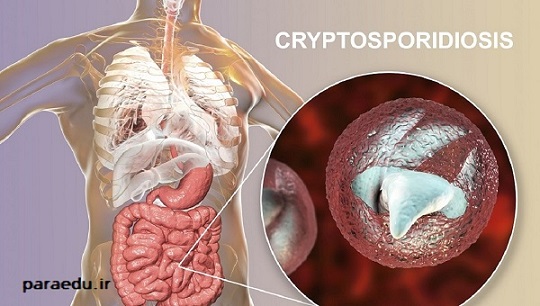Cryptosporidiosis is a type of intestinal infection caused by a microscopic parasite called Cryptosporidium. It can affect humans and animals, especially young children, immunocompromised people, and livestock. In this article, you will learn about the causes, symptoms, and treatment of cryptosporidiosis, as well as how to prevent it.
What causes cryptosporidiosis?
Cryptosporidiosis is mainly transmitted through the fecal-oral route, which means that you can get infected by ingesting contaminated water, food, or soil that contains the parasite’s eggs (oocysts). You can also get infected by coming into contact with infected animals or people, or by touching surfaces or objects that have been contaminated with feces.
Some of the common sources of cryptosporidiosis include:
- Drinking or swimming in water that has been polluted by animal or human waste, such as rivers, lakes, ponds, wells, or pools.
- Eating raw or undercooked food that has been exposed to contaminated water or soil, such as fruits, vegetables, meat, or dairy products.
- Handling or caring for animals that are infected with Cryptosporidium, such as cattle, sheep, goats, pigs, dogs, cats, or rodents.
- Having sexual contact with someone who has cryptosporidiosis, especially oral-anal contact.
- Traveling to areas where cryptosporidiosis is common or endemic.
What are the symptoms of cryptosporidiosis?
The most common symptom of cryptosporidiosis is watery diarrhea, which can last from a few days to several weeks. The diarrhea may be accompanied by other symptoms such as:
- Abdominal pain and cramps
- Nausea and vomiting
- Loss of appetite and weight
- Dehydration and electrolyte imbalance
- Fever and fatigue
The severity and duration of the symptoms may vary depending on the age and immune status of the person. Some people may have mild or no symptoms at all, while others may have severe or chronic symptoms that can lead to complications.
How is cryptosporidiosis diagnosed?
The diagnosis of cryptosporidiosis is based on the detection of the parasite’s oocysts in the stool sample of the person. This can be done by using different laboratory methods such as:
- Acid-fast staining: This is a simple and inexpensive method that uses a special dye to stain the oocysts and make them visible under a microscope.
- Enzyme immunoassay (EIA): This is a more sensitive and specific method that uses antibodies to detect the antigens of the parasite in the stool sample.
- Polymerase chain reaction (PCR): This is a highly accurate and advanced method that uses DNA amplification to identify the genetic material of the parasite in the stool sample.
Other tests that may be done to rule out other causes of diarrhea or to assess the extent of the infection include:
- Stool culture: This is a test that grows bacteria from the stool sample to check for other bacterial infections.
- Blood tests: These are tests that measure the levels of blood cells, electrolytes, liver enzymes, and immune markers to evaluate the general health and immune status of the person.
- Imaging tests: These are tests that use X-rays, ultrasound, or CT scan to examine the internal organs and structures of the abdomen.
How is cryptosporidiosis treated?
The treatment of cryptosporidiosis depends on the severity and duration of the symptoms, as well as the underlying health condition of the person. In most cases, cryptosporidiosis is self-limiting and resolves on its own within a few weeks without any specific treatment. However, some people may need medical treatment to relieve their symptoms and prevent complications.
The main goals of treatment are:
- To prevent dehydration and electrolyte imbalance by drinking plenty of fluids and oral rehydration solutions (ORS).
- To reduce diarrhea and abdominal pain by taking anti-diarrheal medications such as loperamide or bismuth subsalicylate.
- To enhance immune function and fight off the infection by taking antiparasitic medications such as nitazoxanide or paromomycin.
- To treat any underlying conditions that may impair immunity or increase susceptibility to infection such as HIV/AIDS, cancer, organ transplant, or inflammatory bowel disease.
How can cryptosporidiosis be prevented?
The prevention of cryptosporidiosis is based on avoiding exposure to the parasite and practicing good hygiene measures. Some of the effective ways to prevent cryptosporidiosis include:
- Boiling or filtering water before drinking or using it for cooking or washing.
- Washing hands thoroughly with soap and water before eating or preparing food, after using the toilet or changing diapers, after handling animals or their waste, and after touching anything that may be contaminated with feces.
- Washing fruits and vegetables well before eating or peeling them, and cooking meat and eggs thoroughly before consuming them.
- Avoiding swimming or bathing in water that may be contaminated with feces, and showering after swimming or bathing in any water source.
- Cleaning and disinfecting surfaces and objects that may be contaminated with feces, such as toilets, sinks, countertops, toys, or utensils.
- Wearing gloves and protective clothing when handling or caring for animals that may be infected with Cryptosporidium, and disposing of their waste properly.
- Practicing safe sex by using condoms and avoiding oral-anal contact with someone who has cryptosporidiosis.
- Seeking medical attention if you have symptoms of cryptosporidiosis, especially if you have a weakened immune system or a chronic health condition.
Conclusion
Cryptosporidiosis is a common and potentially serious intestinal infection that can affect anyone. By knowing the causes, symptoms, and treatment of cryptosporidiosis, you can protect yourself and others from this parasite.
 انگل شناسی پزشکی Medical Parasitology
انگل شناسی پزشکی Medical Parasitology


